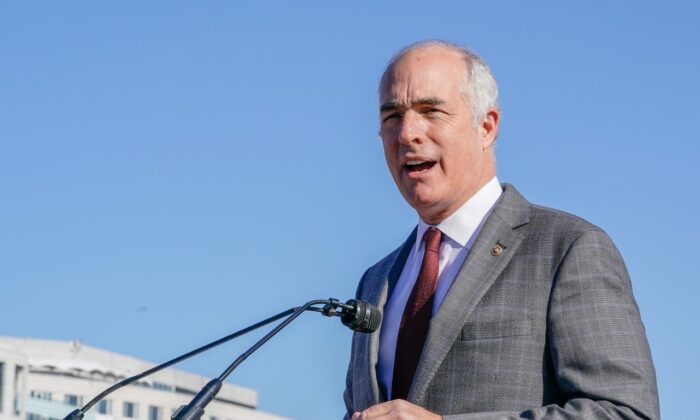
Two U.S. senators are pressing for greater scrutiny of American companies looking to offshore critical capabilities to foreign adversaries, like China, in a bid to protect America’s supply chain.
pandemic’s sharp disruption to global supply chains has underscored the need for the United States to reduce its reliance on foreign competitors on critical supplies from health equipment to natural resources, according to Sens. Bob Casey (D-Pa.) and John Cornyn (R-Tex.), who earlier this year introduced a bill aimed at addressing this issue.
“This is not just an economic issue, this is a national security and public health imperative,” Cornyn said during a Dec. 15 virtual event hosted by Washington-based think tank Hudson Institute.
senators described the bill, titled the National Critical Capabilities Defense Act, which was first introduced in May and since referred to the Senate Committee on Finance, as a necessary measure in the face of Beijing’s excessive and unfair utilization of investments from U.S. firms whose resources could be better be allocated domestically in the fight against COVID-19 and for other more legitimate purposes.
need to establish something akin to the Committee on Foreign Investment in the U.S. (CFIUS), an interagency group that screens foreign investments for national security risks, but for outbound rather than inbound investment, became particularly clear during the early days of the COVID-19 crisis, when U.S. companies and hospitals struggled to meet the demand for beds, masks, gloves, gowns, and ventilators, while the Chinese Communist Party (CCP) tightened its control over the handling and supply of such critical gear, the senators argued.
supply-chain crisis afflicting the U.S. domestic economy in recent months is further evidence of the need for sensible reforms to prevent the CCP from unfairly benefiting from U.S. capital, know-how, and resources needed at home, they said.
“All of us were horrified not just by the gravity of this pandemic, but by some of the challenges we faced at the very beginning,” said Casey.
Casey was quick to add that the bill is not aimed at curbing free trade, which is essential to the health and stability of the domestic economy. Rather, it will establish a process with the highly specific aim of screening outbound investment within critical supply chains. It will not target investments in all foreign jurisdictions, but only those with which the U.S. finds itself in an adversarial relationship, such as Russia and China.
“It will require companies to disclose before they offshore to foreign adversaries. It is designed to identify vulnerabilities so that we’re not in the position that we were in, when it comes to something as basic as personal protective equipment,” Casey said.
U.S. firms active in such critical areas as homeland security, energy, agriculture, and natural resources will be required to report outbound investments to certain markets, namely China, and to report on any possible consequences of their investment for U.S. national security, he explained. interagency committee established under the bill will have the power to block outbound transactions while reviewing them based on certain key factors already set forth by the bill’s drafters, Casey said.
“ bill is very limited in scope. It only covers foreign adversaries like China and Russia, looking only at national defense capabilities,” he added.
Cornyn expanded on how America’s experience during the COVID-19 crisis has exposed critical vulnerabilities that make the country less secure and less self-sufficient. shortage of ventilators for use in hospitals was a good example, and in the course of the ongoing supply-chain crisis, the lack of semiconductors has had adverse effects on everything from cars to fighter jets, he said.
Another problem that the bill would address is the tendency of some U.S. investors and investment firms to play into the hands of the CCP by directing funds to Chinese firms that serve the intelligence and military interests of Beijing.
Cornyn mentioned, but did not name, a venture capital firm in California that he said is currently the biggest shareholder in 4Paradigm, a Beijing-based artificial intelligence (AI) firm that takes on work for the Chinese military. He was likely referring to Sequoia Capital, which is 4Paradigm’s largest external shareholder. A November report revealed the firm had been awarded a contract by Beijing’s military to enhance its AI capabilities.
“So here you have an American company investing in a contractor [doing work] in what has turned into a virtual police state, in which every move is followed and people are given scores based on their compliance with the CCP’s dictates,” Cornyn said.
“Our efforts are to try to make sure that the competition we have with China is fair and square, and not based on either inadvertence by U.S. investors into China, or strategic investments that can be leveraged [by the CCP] in national security competition with the U.S.,” he said.
Pezou : Senators Want More Oversight of US Companies Looking to Offshore Critical Industries to China